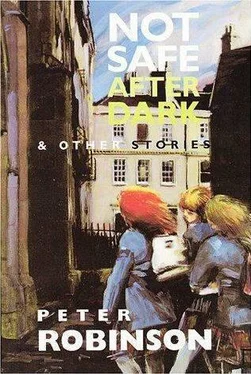Banks stood up and looked down at the books. Well, there they all were, for what they were worth, like those strata of different coloured rock or the layers of antiquities at an archaeological dig. His mother called up: ‘Alan, are you coming down? Lunch is on the table. It’s potted meat sandwiches.’
Banks sighed. ‘Coming,’ he shouted. ‘I just have to wash my hands. I’ll be right there.’ True, he had once loved potted meat, the same way he had liked Sugar Puffs and toad-in-the-hole, when he was a teenager, but he hadn’t touched the stuff in years.
The people next door were out in force, Banks noticed, on his way to see Mrs Green after lunch. There was an unmarked delivery van outside their house, and two strapping young lads were carrying what looked like a fifty-inch television set up the path. It hardly looked as if it would fit through the door. Fred and Rosemary stood on the lawn, rubbing their hands together in glee, practically salivating at the sight, and their various children, aged between about five and fifteen, milled about beside them. Banks hadn’t seen so many shaved heads since the nit nurse had visited his school. He tried wishing them good morning again, but everyone was far too intent on the imminent television even to notice him. He would have bet a pound to a penny it was stolen.
The wind had picked up even more, Banks noticed, bringing a few fast-flying clouds and a chill with it, and there was a smell of rain in the air. Banks zipped his leather jacket all the way up and walked the short distance to the close, where Mrs Green lived. She answered Banks’s knock and expressed delight at seeing him again. She had certainly aged – thickened at the waist, drooped at the bosom – but she had lost none of her sprightliness, and she fussed around making tea and bringing out a plate of scones. Her living room was sparsely decorated – plain cream wallpaper, no prints or paintings – and a few framed family photographs stood on the mantelpiece.
‘How’s Tony doing?’ Banks asked. ‘I’ve always regretted we didn’t manage to stay in touch.’
‘These things happen,’ said Mrs Green. ‘People drift apart over the years. It’s only natural. It doesn’t mean they don’t share good memories, though.’
‘I suppose not.’
‘Anyway, Tony’s doing fine. He lives in Vancouver now, you know. He’s a tax lawyer. This is him about two years ago.’ She picked up one of the photographs and handed it to Banks. It showed the smile he remembered, the mischief in the eyes, surrounded by a bald head on a pudgy body in brightly coloured shorts and a red T-shirt. Tony stood with a relaxed, smiling woman Banks took to be his wife, and two bored and /or cool-looking teenage children. They were on a beach and there were cloud-topped mountains in the background. ‘I’ll let him know you were asking about him,’ Mrs Green said.
‘Please do.’ Banks replaced the photo on the mantelpiece. ‘I’ve been to Toronto, but never Vancouver.’
‘You should go if you get a chance. Bill and I visited him there five years ago. It’s a lovely city. I’m sure Tony and Carol would be happy to have you stop with them. They’ve got a big house.’
‘Maybe I will,’ said Banks.
‘We don’t see you down here very often, do we?’
‘Well,’ said Banks, feeling guilty he hadn’t made time for Mrs Green on his previous visit, ‘I keep pretty busy up north. You know how it is.’ He sipped some tea.
‘Your parents are really very proud of you, you know.’
Banks almost choked on his tea. Where had that come from?
Mrs Green considered him through her tortoiseshell glasses. ‘You might not think so,’ she said, ‘and they might not admit it, but they are. Especially since that business last summer.’
‘What makes you say that?’
‘Oh, don’t think I don’t know about your differences. They never did approve of what you chose to do with your life, did they? Your dad thought you’d joined the enemy and your mother thought you’d let her down. That was clear enough to anyone who knew them.’
‘Was it?’
‘Oh, yes. And I knew where they were coming from, of course.’
‘What do you mean?’
She smiled. ‘Oh, don’t be so obtuse, Alan. You always did have that infuriating habit of pretending not to see the obvious. You wouldn’t have got far in your chosen career if you couldn’t even add together the basics. You had all the opportunities; they had none. They had to settle for their lot in life. And the Thatcher years were pretty tough around here. How do you think your dad felt when he saw coppers laying into workers on the news? Miners, whatever they were, they were still working men, like himself. How do you think he felt when he saw the police in riot gear waving their overtime pay in the faces of men who’d lost everything? Do you think he actually enjoyed working at that factory every day of his life? I’d say it was a cause for celebration when they made him redundant, but for him it was a blow to his pride. And your mother, cleaning up other folk’s messes? They made a lot of sacrifices for you, so you could do better than they had. And what did you do? You joined the police force. You must have known how people around here felt about the police.’
‘I’d say they expect us to make sure their cars are safe and keep the muggings and gang fights to a minimum.’
‘You always were a cheeky young beggar, Alan Banks. Perhaps now they do. But not back then.’
‘I know what you mean,’ said Banks.
‘But what I’m telling you is they know you’ve done well for yourself now. Every time you got a promotion they told me, and you should have heard the pride in their voices. “Our Alan’s a detective sergeant now,” they’d say. Or “They’ve made Alan detective chief inspector now!” I got sick of hearing about you. It just took them a long time to work it out, and they don’t find it easy to express. It also helped that you came down on the right side last time you were here. Of course, they always did dote on that useless brother of yours.’
‘Roy.’
‘Yes. I’m sorry, but you know I’ve always spoken my mind, and I can’t say I ever took to him. Sly, he seemed to me, two-faced, always up to something behind your back. You were no angel, mind, but you weren’t sly.’
Banks smiled as he buttered his scone, thinking about the time he had orchestrated going to bed with Kay while his parents were visiting his granny, and the time he and Tony Green had drunk some of Mr Green’s whisky and topped the bottle up with water. Whether he spotted it or not they never knew. Sly? All kids are sly, Banks thought; they have to be in their constant struggle with the inexplicable and unreasonable rules and regulations imposed on them by adults. But Banks knew how to take a compliment when he was offered one, even at the expense of his brother.
‘Thanks,’ he said. ‘Roy could be a bit of a handful.’
‘To say the least. Anyway, I don’t see much of your mum and dad any more, except when I bump into Ida on the street,’ Mrs Green went on. ‘That’s how I knew about the golden wedding. She invited me. It’s sad, though. People seem to isolate themselves when they get old. They don’t get out as much, and I don’t go to the Coach and Horses. How are they?’
‘Same as ever,’ said Banks. ‘Mum’s complaining about varicose veins and her bunions, but she doesn’t seem to do too badly. Dad’s still got his angina, but it doesn’t seem any worse. There’s a neighbour helps out. Bloke called Geoff Salisbury. Know him?’
Banks couldn’t swear to it, but he thought Mrs Green’s expression darkened for a moment. Her lips certainly tightened.
‘I know him,’ she said.
Читать дальше










![Джеймс Чейз - Not Safe to Be Free [= The Case of the Strangled Starlet]](/books/417649/dzhejms-chejz-not-safe-to-be-free-the-case-of-the-thumb.webp)

